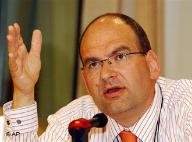Bundeswehr Accused of Deleting Secret Intelligence Files
Secret German military and intelligence files from 1998 to 2003 were reported to have gone missing due to technical malfunction, according to German media reports, leaving some to wonder if they were deleted on purpose.
A German parliamentary committee received a new answer to its request to see a set of classified military files from 2002: A "technical failure" led the data over the four-year span to be irrecoverably destroyed, German public broadcaster ARD reported Monday.

Information regarding four years worth of information sent back from military troops stationed in Afghanistan and Kosovo, the Federal Intelligence Agency, military attaches and foreign intelligence services is thought to be among the data destroyed at the Defense Ministry's Center for Bundeswehr Communications, according to the ARD report.
Details of possible German involvement in a secret US-run prison in Bosnia, where terror suspects were allegedly interrogated before and after the Sept. 11, 2001 attacks in the United States, are also missing, according to a report in Tuesday's daily Berliner Zeitung.
"That the information is gone has probably made things easier for some of the people who where were in charge back then," an anonymous security expert told the paper.
Destroyed in accordance with regulations
Bernhard Docke, a lawyer for Murat Kurnaz, a German-born Turk who was held without charges for five years at the US prison in Guantanamo Bay, Cuba, told the dpa news agency that he suspected data about his client was intentionally deleted.
However, he added that he had enough information to file charges of abuse against members of the German military who allegedly interrogated Kurnaz.
In a letter to a parliamentary committee, Deputy Defense Minister Peter Wichert wrote that the data was transferred to a single set of tapes that could later not be read.
"An attempt to read the tapes in a replacement device to restore the data failed," he wrote. "In accordance with the current regulations dealing with the classified material, the no longer readable tapes were destroyed on July 4, 2005."
German politicians, however, were skeptical of the defense ministry's statement that the technical failure and limited memory capacity in the system tasked with saving the intelligence reports made the lost information irretrievable.
'Smells of premediatation'
Green party politician Hans-Christian Ströbele, who is a member of the intelligence services' parliamentary oversight committee, said he received a letter from Wichert in November in which there was "no mention of the data being gone," Ströble told the Neue Presse on Tuesday.
"Sometimes the answer was that I can't have the information, sometimes the answer was that the KSK (an elite Germany military unit) wasn't involved in the activities," Ströbele said of other information requests he had made. "The answer was never: 'We do not have the information.'"
Intelligence service expert Erich Schmidt-Eenboom said the defense ministry's decision not to request the help of other government departments or data retrieval specialists "smells of premeditation.
"There is the Federal Criminal Police Office and several highly specialized companies that have long been in a position to save and reconstitute damaged data storage devices," he told the Berliner Zeitung.


